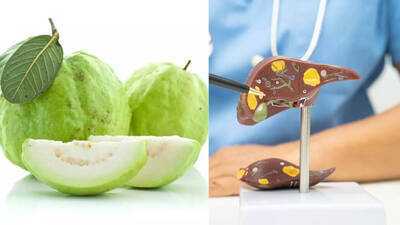
Researchers at the University of Delaware have discovered a promising new pathway to treat liver cancer using molecules derived from guava plants. Using a process called natural product total synthesis , the team led by William Chain, associate professor in the Department of Chemistry and Biochemistry, has developed a low-cost, scalable method to recreate these compounds in the lab. The innovation could dramatically expand access to liver cancer treatments, which remain prohibitively expensive and have low survival rates. By providing a “recipe” for producing guava molecules, the researchers hope to foster global collaboration and accelerate the development of effective, affordable therapies for one of the world’s deadliest cancers.
Liver cancer and nature as a source of medicine
Medicines derived from natural sources have long shaped modern healthcare. From willow bark’s salicin, which became aspirin, to a host of plant-based therapies, nature provides powerful chemical compounds for treating disease. However, natural resources are often limited, making large-scale production difficult. The University of Delaware team’s method addresses this by using readily available chemicals to recreate guava molecules, enabling researchers to produce sufficient quantities for laboratory studies and eventual clinical use. This approach bridges the gap between natural compounds and mass-produced medications, ensuring treatments remain accessible.
The guava molecule and liver cancer treatment
The guava-derived molecules identified by Chain and his team have shown promise in targeting liver and bile duct cancers. These cancers are among the most challenging to treat, with late-stage five-year survival rates below 15% and tens of thousands of new cases diagnosed annually in the U.S. alone. By synthesizing these compounds in the lab, researchers can study their effectiveness more efficiently, explore potential combinations with existing treatments, and optimize their anti-cancer properties without relying on harvesting large quantities of the plant itself.
Low-cost, scalable synthesis
The breakthrough lies in the reproducibility and affordability of the synthesis process. Using natural product total synthesis, the team provides a step-by-step method that scientists worldwide can follow. “The majority of clinically approved medicines are either made from a natural product or based on one,” Chain explained. “But there aren’t enough natural resources to make enough treatments. Now chemists can take our manuscripts and basically follow our ‘recipe’ to produce it themselves.” This democratizes access to potentially life-saving molecules, particularly in regions where liver cancer treatments are financially out of reach.
Global collaboration and future research
The discovery has already sparked interest from researchers and institutions around the world. Doctoral student Liam O’Grady, the article’s first author, emphasized the potential for collaboration: “We are the first to pave that road, and others can repave it any which way. Find the shortcuts if they have to. But since we entered unknown territory, we helped shed light on a pathway that can get us there.” The team is now working with the National Cancer Institute to explore the guava molecule’s effectiveness against other types of cancer and to advance preclinical studies for liver cancer therapies.
Potential impact on liver cancer treatment
With liver and bile duct cancer cases rising globally, the development of affordable, effective treatments is urgent. By offering a low-cost method to synthesize natural anti-cancer compounds, the University of Delaware team’s research could significantly improve patient outcomes and reduce treatment costs. Their work highlights the continuing importance of nature-inspired drug discovery and the value of scalable, collaborative approaches to fighting some of the world’s deadliest cancers.
 Researchers at the University of Delaware have discovered a promising new pathway to treat liver cancer using molecules derived from guava plants. Using a process called natural product total synthesis , the team led by William Chain, associate professor in the Department of Chemistry and Biochemistry, has developed a low-cost, scalable method to recreate these compounds in the lab. The innovation could dramatically expand access to liver cancer treatments, which remain prohibitively expensive and have low survival rates. By providing a “recipe” for producing guava molecules, the researchers hope to foster global collaboration and accelerate the development of effective, affordable therapies for one of the world’s deadliest cancers.
Researchers at the University of Delaware have discovered a promising new pathway to treat liver cancer using molecules derived from guava plants. Using a process called natural product total synthesis , the team led by William Chain, associate professor in the Department of Chemistry and Biochemistry, has developed a low-cost, scalable method to recreate these compounds in the lab. The innovation could dramatically expand access to liver cancer treatments, which remain prohibitively expensive and have low survival rates. By providing a “recipe” for producing guava molecules, the researchers hope to foster global collaboration and accelerate the development of effective, affordable therapies for one of the world’s deadliest cancers.